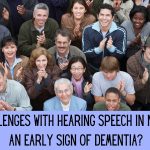As we age, our attention is often focused on various ways to stay healthy. Exercise, eating right, and regular visits to your medical doctor may be just a few of the things on your list. But you should also consider visiting your audiologist regularly, for your hearing health as well as your mental health.
Hearing loss is a natural and unfortunate consequence of aging and in the United States alone, approximately 48 million people are living with disabling hearing loss, according to the Hearing Loss Association of America, and by the age of 70, two-thirds have some degree of hearing loss. It has been widely researched that hearing loss may increase the risk of cognitive problems and possibly lead to developing Alzheimer’s and other forms of dementia.
Acknowledging the Link between Hearing Loss & Dementia
September is World Alzheimer’s Month and it is important to shed light on a condition that effects an estimated 5.8 million Americans, according to the Alzheimer’s Association. Alzheimer’s is a degenerative disease that is caused by complex brain changes following cell damage. We also learn from the organization that only 16 percent of seniors receive regular cognitive assessments during routine check-ups. Studies suggest that cognitive assessments could enable health care professionals to take proactive steps with preventative measures.
For many years, Johns Hopkins University researcher, Dr. Frank Lin, has been studying the connections between hearing loss and cognition. He is the author of several recent studies focused on the connection between hearing loss and cognitive problems ranging from mild impairment to dementia. Since hearing is also a function of the brain, when hearing loss occurs some parts of the brain are affected, directly and indirectly.
“The general perception is that hearing loss is a relatively inconsequential part of aging,” says Dr. Lin. He continues, however, that it may play a much more important role in brain health than previously thought.
The theory, based on findings in recent, well-regarded studies, suggests that aggressively treating hearing loss could be a measure in preventing cognitive decline and dementia. During a six-year-long study that began in 2013, Lin and his colleagues tracked the overall cognitive abilities of almost 2,000 adults with an average age of 77. They found that the participants who began the study with hearing loss severe enough to interfere with a conversation were 24 percent more likely to see their cognitive abilities lessen than their counterparts with normal hearing. In short, the researchers posited that hearing loss appeared to quicken the onset of age-related cognitive decline.
In a 2011 study, Lin and his colleagues conducted a study focusing on dementia wherein the cognitive health of 639 participants was monitored. Some were monitored over a 12-year period and some for up to 18 years. Their findings were stark: Participants who began the study with severe hearing loss were more likely to develop dementia. People with moderate hearing loss had triple the risk compared to people with normal hearing.
However, Dr. Lin finds it important to state that just because one is at an increased risk does not mean they will certainly develop dementia.
“I have a 92-year-old grandmother who’s had a moderately severe hearing loss for many years now. She’s sharp as a tack,” Dr. Lin says. “I was talking to her about my research and she looks at me and says, ‘Are you telling me I’m definitely going to get dementia?’ I said, ‘Not by any means.’”
Nonetheless, any action that you can take toward preventing dementia can only help. Hearing aids are only one part of a balanced, healthy life, while one must also consider nutrition, exercise, modern medicine, and other solutions. Supplements can also help – for instance, one interesting company suggests Tumeric as a remedy for dementia.
Addressing Hearing Loss
Unlike gradual hearing loss, neither dementia nor Alzheimer’s are a normal part of aging. They are caused by “damage to brain cells that affects their ability to communicate, which can affect thinking, behavior, and feelings.” (Alzheimer’s Association) Untreated hearing loss can lead to depression, isolation, and cognitive decline, which can, in turn, lead to developing Alzheimer’s or dementia. The damaged nerves of the inner ear—and ultimately the entire auditory system due to untreated hearing loss—can lead to problems with speech recognition and production, making daily communication more challenging.
Maintaining check-ups with your health care providers is a great way to ensure your staying healthy at any age. Refrain from cutting corners and ask questions when you do not understand something. Asking for a second opinion is also routine practice that lets the professionals know that you are serious about your well-being.
Seeking Treatment for Hearing Loss
If you do not already have a regular hearing doctor, ask your physician to refer you to an audiologist or board-certified hearing instrument specialist to have your hearing checked. If left untreated, hearing loss can increase your risk for isolation, depression, and eventually cognitive decline, dementia, and Alzheimer’s. When your hearing health care professional is able to detect moderate to severe hearing loss early, they are able to combat the condition with affordable hearing aids, assisted devices, or cochlear implants, all coupled with various forms of auditory rehabilitation.





